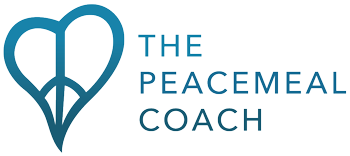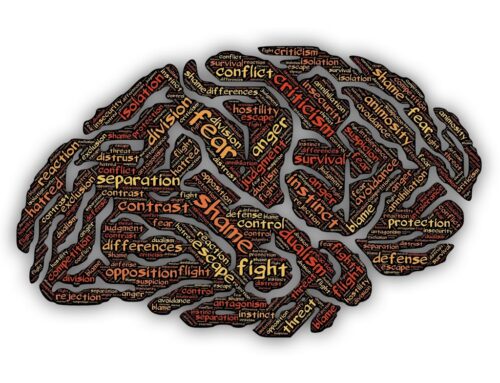Prior to my daughter’s anorexia, if you had asked me to list my biggest parenting mistakes, I would have had a short list. Even after 17 years of mothering 3 kids, I would have needed some time to think about what big mistakes I thought I had made. Overall, I was happy with my parenting. After anorexia, the story is different. I made mistake after mistake with the best of intentions. The learning curve was steep, but ultimately, 8 mistakes I made taught me the most about anorexia. I share these mistakes with you because they all added up to me failing, continuing to take action, and figuring out how I could take charge of my daughter’s recovery. It was hard. It was painful. It was beyond worth it.
Mistake 1: I promised I wouldn’t ask her to eat anything I wasn’t willing to eat.
What I learned: It is okay for every person in the family to eat according to their own nutritional needs.
I thought if I ate the same food that she ate, that she would be less terrified to eat. I thought I could eat a normal amount of food, ask her to eat a normal amount of food, and that in a short time, she would restore her weight and get better. The hard truth is that she was going to be terrified to eat almost any food in any amount, and she was going to need a whole lot more than the “normal” amount I thought was enough. After one week of coaxing her into eating what I was eating, it was clear that she needed to eat much, much more, and it was also clear that I did not need to be eating that much.
I had to backpedal, but I learned I could tell her that what her body needs and what my body needs are different. I had to learn to see food as her medicine, and I decided to look at it as her dosage was much higher than mine in order for both of us to get the nutrition that was useful for our bodies and brains at this moment in time. I learned that I could handle gaining a little bit of weight in order to model eating all types of food if that is what I wanted to do. I also learned that it was okay for me to add extra butter, cook with extra cream, and require extra snacks and desserts for her without serving the extras to myself and the rest of my family. In the beginning I was desperately trying to get her to eat, so I was willing to overeat to help her. Because she needed 3500 to 4000 calories a day to gain weight on a weekly basis, it wasn’t sustainable for me to match her food intake bite for bite. I had no idea in the beginning just how much it was going to take to get her to her recovery weight.
Mistake 2: I assumed that once she was diagnosed we could immediately find her the help she needed.
What I learned: There is no one-size-fits-all treatment that works for everyone, and finding effective treatment is not a straightforward process.
I thought that once she was diagnosed that we would immediately find treatment and she would get the help she needed to recover. I thought that it was only a matter of looking for eating disorder specialists and getting her the medical and psychological help she needed before she would feel better, and I would know that she was getting the treatment that would get her to recovery. I instead descended into a rabbit hole that left me feeling much worse than I did just knowing that she had anorexia. I truly believed that the right diagnosis would lead to the right treatment. Unfortunately for my daughter and for many others with eating disorders, there is still so much that isn’t understood. Therefore there are treatments that aren’t effective or aren’t readily available and immediately accessible.
Mistake 3: I believed that because she lost the weight quickly, she would gain it back quickly.
What I learned: She needed to eat many more calories per day than I anticipated; it can take a tremendous amount of calories to gain a small amount of weight.
When you are trying to get someone who is terrified to eat to eat more than they have ever imagined eating, and you are asking them to eat that amount up to six times daily, it is not a fast process. My experience with my own dieting and weight loss was that the more I restricted my calories in order to lose weight, the easier it was for me to gain back the weight I lost. I had the understanding that the metabolism slows with food restriction, so I was shocked when the first week of my daughter eating significantly more than she had been eating during her rapid weight loss resulted in a further loss of almost 2 pounds.
I had decided to be responsible for feeding her at home to get her weight restored because I had learned that FBT (family-based treatment) was considered the most effective for adolescent recovery, but I had not yet learned that she would need 4000 calories a day to begin gaining weight. I had decided because there was limited treatment available locally that I would get started feeding her, try to keep her health from deteriorating, monitor her medical condition, and continue searching for better treatment options. It was so challenging to get her to start eating a normal amount of food, but I mistakenly believed that would be enough. We were in for weeks of resistance, and months of needing to increase her food intake, and it was a huge obstacle that was completely unexpected.
Mistake 4: I thought she would want to get better as much as I wanted her to get better.
What I learned: Those with anorexia nervosa often have anosognosia, which means they have an inability to accurately perceive their illness.
They may believe they are fine regardless of how much medical proof there is that their health is deteriorating. When someone with an eating disorder is terrified to eat and is unaware that their health is in serious jeopardy if they don’t eat, it is confusing and frustrating for parents. What appeared to me to be defiant denial of a serious illness with potentially dire consequences, was not a problem to my daughter. She was not able to want to get better at a time when I assumed she would be as desperate to get help as I was. Parents need to know that their child most likely won’t see any need to get help in the beginning, and that doesn’t mean that there is nothing you can do. You don’t have to wait until she wants help to seek it. Even without motivation to recover, parents can still require her to eat, to go to medical appointments, and to participate in appropriate treatment.
Mistake 5: I used a contract to get her to comply with her food plan without including weight gain as a condition.
What I learned: It is possible for them to do everything that you ask of them in order to earn incentives and privileges under a contract, and to still lose weight.
At first, my teen was not medically stable enough to attend school or continue with her ballet training. Because school and ballet were the two things in her life that she most cared about, the advice I received from the resources I had at the time was to create a behavioral contract that she was required to adhere to in order to regain the privileges of school and ballet. I used a template that was quite general to create a contract that seemed reasonable.
In hindsight, every step I was taking at the time was a shot in the dark to try to do everything possible to help my child. I started with the contract thinking that it would help her emotionally because losing dance and school resulted in a severe increase in her level of anxiety, and she became very depressed.
As it turns out, I don’t believe a behavioral contract was a good tool for us at the time that I tried to use it. The only contingency that needed to be considered was weight gain. Weight gain was the gateway to everything else, but I wasn’t far enough along on the learning curve to know just how much effort and time and trial and error it was going to take for her to gain weight. That being said, contracts can be very helpful in some cases.
Mistake 6: I allowed her to see her weight on the scale during weekly weigh-ins.
What I learned: Stepping onto the scale and seeing that she gained weight resulted in significant setbacks, increased resistance, elevated anxiety, and deep depression.
It is part of the FBT model for those with eating disorders to see their weight on the scale. I know that many parents do it that way. The theory behind it may be to decondition the person with the ED to being triggered by the number on the scale, but the time to do that, in my opinion, may not be at the very beginning of the weight-gain process. It is my belief that parents are in the best position to decide how to manage weigh-ins.
In the first few months, weighing at the doctor’s office once a week without her seeing her weight was a strategy that we tried after our first few attempts at weighing her at home set us back significantly. Even those weigh-ins were a challenge. I wrongly assumed that the nurses, doctors, and all other personnel at the pediatrician’s office would know how to manage weighing her once I asked them to do it discreetly. Instead, there was a reaction from one or several people that clearly indicated whether she had gained or lost weight, and my plan of having a neutral logging of her weight in the chart was sabotaged.
Yes, she had to eventually get used to the fact that she had to gain weight in order to recover, but the most important thing in the beginning was getting her to eat. Eating enough to restore health both mentally and physically can be accomplished without her knowing her weight every week and without too much emphasis put on her weight as the only measure of progress. Depending on the treatment you decide upon, I think parents need to assert themselves without assuming that the eating disorder professionals have all of the answers. This is one area where I learned to trust myself to decide what was best for my daughter.
Mistake 7: I hired a treatment team that wasn’t aligned with what we wanted.
What I learned: I cannot assume that all eating disorder specialists will know the latest evidence-based research and be trained to fully support the parent.
As soon as my daughter’s pediatrician diagnosed her with anorexia, we started weekly medical visits, weigh-ins, and lab tests, and I set out to find the best treatment I could for her. Because my initial search came up short locally, I decided to immediately start refeeding her at home by following FBT guidelines as they are laid out in various books I found, but I kept searching for a “treatment team.”
I thought treatment teams were well established and would be easy to find, but I had a very hard time finding them and accessing them, so I went about creating my own. A resource that has been invaluable to me is FEAST ATDT, a forum for caregivers that provides resources and support. Many parents on the forum website have been able to help their children recover from anorexia without the help of a treatment team or by working with various professionals to create a treatment team.
I found an out of state therapist and nutritionist who already worked together as eating disorder specialists and who were able to meet with my daughter virtually. They were willing to communicate with our pediatrician who does not specialize in anorexia, but was open to learning and medically supporting my daughter’s treatment. I felt a lot of pressure to have all of these professionals working together to treat my daughter because so much of what I studied about anorexia recommended a treatment team. I explained to all of them that I was feeding her at home, and that for the short term, anything they could do to support my efforts to communicate that food was her medicine, was the main emphasis that I expected as far as their work with her.
While I made it very clear that I was taking charge of feeding her and that I wanted full support of that, I soon realized that they were prioritizing concepts that were completely counter to what I was trying to accomplish. I learned that these specialists didn’t know as much about anorexia as I assumed they did. I also learned that they weren’t as willing to keep me informed about what they were working on with my daughter as they assured me they would at the beginning of the process.
The worst part of all was that working with this team actually hurt my daughter’s progress. While we were trying desperately to get her to eat enough to restore her weight, she was being told that her parents weren’t the food police, she was being taught to use a hunger scale when she had absolutely no hunger cues, she was taught not to overeat and to apply intuitive eating, she was being told that her family needed to stop being selfish and to understand that she was very ill and shouldn’t be expected to be attend any events in support of her siblings, she was being told that she needed less stress and she should not pursue advanced academics, she got mixed messages about having to quit ballet or needing to continue it, and she was constantly told they were worried about her.
No members of her original treatment team taught me anything about anorexia. None understood that she needed a tremendous number of calories, or that it was normal for her not to want to get better. They seemed to think I was overcontrolling, and they didn’t understand that I was taking control because she stood her best chance of getting well if I could get her to eat more. They wanted her to start socializing when we were hoping she could stay alive.
The disconnect between what the treatment team was doing and what we were needing was huge.
I stayed in self doubt for several months thinking that she had to have their help or else I was not being a good mom. I finally realized that her progress was being hurt by the mixed messages she was receiving. I was shocked, but I am not alone in experiencing this. Many families seek treatment for their teens, and the treatment does more harm than good. As a result of multiple failed attempts, I learned to trust myself to make informed treatment decisions for my daughter. You can read more about my experience with her first treatment team in this blog article.
Mistake 8: I prioritized her psychological health over her physical health.
What I learned: Food comes first.
When the brain has been deprived of nutrition and the body has little to no fat stores, neither medication nor therapy are shown to be beneficial. In the beginning, food is medicine. Psychological symptoms will improve with food, weight gain, and time. Waiting for her to be motivated before she starts eating, doesn’t work. It isn’t realistic for her to feel psychologically better through therapy in order to get her to feel like eating. I thought her psychological issues were the root of the symptoms, but I learned that she first and foremost needed to eat and needed to gain weight to recover.
Any anxiety, OCD, or other psychological diagnoses that remain after reaching recovery weight can be addressed at that time, and any ongoing issues can be addressed with medicine and or therapy at the right times. In other words, an appointment to see a psychiatrist upon diagnosis of anorexia is not the first priority. I did not know this. I thought psychiatric medication must be a priority. I thought getting her to feel better emotionally was the focus. Instead, I learned that she needed food, love, and more food. I learned this from trial and error and my own research; it certainly wasn’t intuitive. The experts I hired, the advice I got, was all well-intentioned. But my experience emphasizes why we can’t blindly rely on available treatments and assume good results.
Research shows when parents are involved in feeding their adolescents with eating disorders, recovery rates improve. Unfortunately, much uncertainty, misunderstanding, stigma, judgment, confusion, and negativity still surrounds eating disorder treatment and recovery. Parents find themselves on the front lines and are put in the challenging position of making important decisions without the knowledge we need to make them. At first I thought it was horrible that so much responsibility for my child’s outcome landed on my shoulders, until I stepped back and realized that this was the best possible news. I could take charge of her recovery, and in so doing, I was already improving her chances.
A Long Road
When I look back at all of the ups and downs, the mistakes, the fear, the stress, the worry, the disappointment, and the uncertainty of our family’s eating disorder journey, it is messy, ugly, scary and inspiring all at the same time. The long and jagged road we have been down as a family is like a scar that reminds me I survived.
I wanted a straight path to my daughter’s recovery, and what I experienced instead was our own unique portal into the rest of our amazing lives. While it wasn’t easy, and I know obstacles will continue to present themselves, I know we can handle anything that comes our way. I learned I’m capable of failing as many times as it takes and to keep going.
For what it’s worth, the 8 biggest mistakes I made led to where we are today, and I’m so grateful that I made them, learned from them, and kept going. Wherever you are on your eating disorder journey, I hope you will believe in yourself, your parenting, and your ability to love your child, no matter what.






